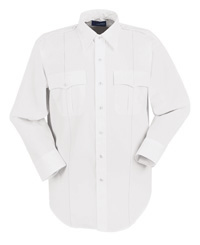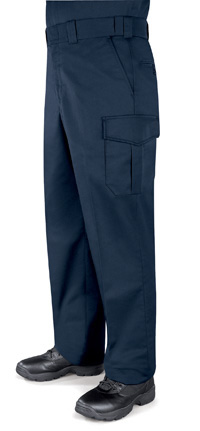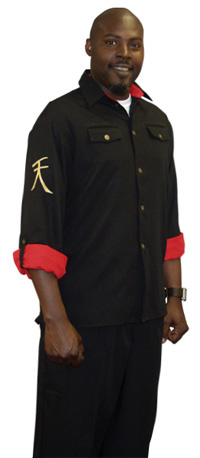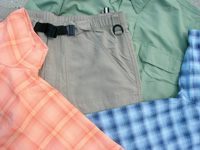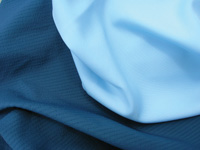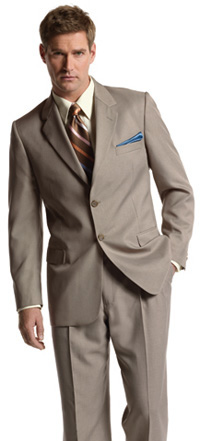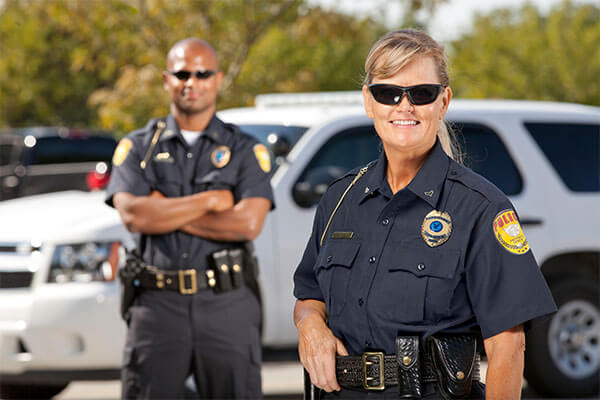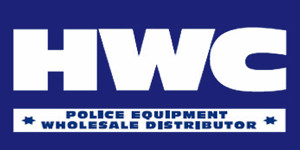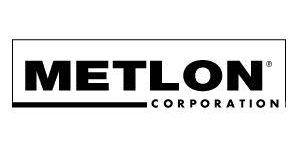|
By Peter Hildebrandt Uniform companies, just like many others, are finding that being more environmentally-sensitive is a good fit both for users and the planet. The push has moved from daily habits, such as the recycling of paper, to the greening of the fabric itself, through recycling of such things as plastic containers into polyester fibers which then are used in the fabrics. Since uniforms often are a product paid for with tax dollars, the double benefit of both saving money and saving the environment comes into play with the limited and precious funding sources. A number of new developments are appearing on the scene. The use of the carbon from natural coconut husks can help make fabric greener without the usual chemicals. The creation of machine-washable wools is exciting news too as uniform companies and their textile providers join the growing ranks of industries going greener. And even for those working in especially insect-prone areas, there may someday soon be uniforms constructed to spare the expense and chemicals of bug spray for our bodies. At the Forefront of the Recycling Issue Unifi has developed a fiber called Repreve made of recycled fibers from plastic bottles. The company obtains empty water or soda bottles for use in creating the fiber. To be certified Repreve fiber, the composition has to be over 30 percent from polyester content. In most of Perfection’s products, it’s more like 50 percent of the product content. “We have reached an agreement to pioneer the Repreve fiber in the uniform industry,” says Gilkeson. “We have formed partnerships with our mill partners, both SwiftGaley and Burlington, to develop the fabrics using Repreve to replace our current polyester in the products. To maintain the high quality standards, we have much better control of consistency standards with U.S. mills than global sourcing. Our goal is to get to the end user and explain what we’re doing.” There is no difference in the look, feel and performance of the fiber, according to Gilkeson. Approximately one pound of Repreve polyester yarn equals nearly one half gallon of gasoline or 50,000 BTUs. “With such a commitment, you’re doing two things; eliminating the landfill issue and also lessening dependence on petroleum, both of which are valid reasons for us to go down this path,” he says. All of Perfection Uniform’s poly-cottons will be switching to the Repreve fibers over the next six months. Perfection is still at work on its 100 percent polyester, but it expects that to change within the next year. “It is a manageable premium cost over normal prices,” adds Gilkeson. “This is a responsible use of taxpayer dollars. If you have a uniform program, whether it’s police, fire, EMS or first-responders or any workers in a department of natural resources, if that agency is going to spend money on uniforms, there is an opportunity to serve dual purposes. Landfill and petroleum use is minimized, saving the taxpayer money. With such benefits, why wouldn’t you want to do something like this? This is a very strong and timely initiative, we believe; I see no reason why every public service, taxpayer-supported agency in the U.S. shouldn’t do this.” Gilkeson regards public service workers as walking reminders of environmental responsibility for the community. He also notes that state, federal and even some private programs and industries are giving preferences to environmentally responsible products. These can be seen in such things as park benches or other projects in which contractors may be involved. Perfection is known for innovation and has won UniformMarket’s UNIVATOR Award for the past three years. It’s also been named by Apparel magazine as one of the top 50 most innovative apparel companies in the world. Gilkeson points out that, within the past five to eight years, the technology for recycling polyester fabric has changed. Just that many years ago it was not feasible to recycle polyester. “Now, though, there is no discernable difference in both the dying or the fabric quality, between recycled polyester fabrics and those made the traditional way,” says Gilkeson. Gilkeson had looked into the possibility of doing this before it became popular years ago. He found at that time that the recycled fibers were not as strong as the regular fibers. “The technology has improved, just like all green technology. I think the technology has actually improved more over the past five years than it has over the last 50 years.” The fabric Perfection had developed was a spun yarn that had not been previously available. Spun yarn is used in blends of poly-cotton and gives a more realistic look and feel. The Repreve had been used in filament yarns, which are more like fishing line. “We knew we were at the forefront; nobody else had this product. We’re now even getting interest in this outside our normal niche, interest from such places as private bottling companies who want to be seen as environmentally conscious.” Gilkeson doesn’t see a shortage of plastic, such as that from plastic bottles, anytime soon even if they stopped making them now. Though Perfection Uniforms is also keeping an eye on organic cotton products, at this point it is still too expensive an option, and Gilkeson feels there’s also a problem with cotton grown with color in the fiber. Right now, it does not work for the uniform industry, as consistency is required in uniform fabrics. Perfection has also made significant progress with its 100 percent polyester and it is partnering with Raeford/Burlington on it. They expect to have a certified fabric by the end of the year, according to Gilkeson. “I’d also like to add that Raeford/Burlington have been important developmental partners. Burlington is also developing both 100 percent poly and poly/wool blend fabrics. Raeford/Burlington are very involved now, especially since there has been such a groundswell response. Ever since our press release came out in mid-2009, we’ve been receiving interest from all over the world. Interest is exceeding my most optimistic hopes, Gilkeson says. “We’re trying to balance things. We could come into the market with a wonderful product; but if it’s more than an agency will allow, then it goes for naught. We must be within about 10 percent of what they’re used to paying or it doesn’t work. We’ve entered into our partnership with Unifi to make the product affordable, and we’re committed to a certain amount of the product over three years to get this launched. We’ve been given a bit of a price advantage so that we can offer the product at an affordable and reasonable premium that will fit into existing budgets. Were it 50 percent more, they’d say ‘Gosh that’s a nice product, I wish I could afford it.'” At present, Gilkeson feels that the amount of recycled polyester on the market remains in single-digit percentages. “But it’s something we see as a real growth opportunity. The reception we’ve received has been much more positive than I imagined; I expected more cynicism from our dealers who don’t like to change. In uniforms it should be the norm to be eco-responsible.” Green at All Ends of the Operation Henry points out that theirs is essentially a real business-to-business type of situation. Superior’s customers are corporations, not individuals, and the corporations are what drive the ‘green machine’ so to speak at least when it comes to Superior’s business. Superior sells to the supermarket, food service and hospitality industries, among others. The push to go green is huge in the hotel world. Henry receives newsletters from these industries at least twice a week. The food service and hospitality industries are building LEED-certified (Leadership in Energy and Environmental Design) hotels, and in those hotels, just about everything has some connection to being eco-friendly whether it’s energy savings, recycled materials or many other features. For Superior it’s clearly all about using recycled and organic materials. The company uses polyester fibers made from recycled plastic bottles. But there are other recycling programs also where relationships with customers can be started up in efforts to work together for recycling of the post-consumer article. For example, after a uniform has seen its life as a uniform, it can be sent to the recycled textile market where it often is converted into rags for automotive wipe cloths. Wal-Mart sends recycled textiles to the automakers, and they use those for stuffing in car seats, according to Henry. Textile recycling occurs in two areas: making the garment with recycled fibers and post-use recycling of cloth. “The main thing I would most like people to know is that there is absolutely no issue to performance with the recycled polyester,” adds Henry. “It was hard in the uniform business to jump right into this; but for us, the uniforms have to perform, and not all of the other eco-friendly fabrics that are out there have developed in a way consistent with our standards for uniforms.” Henry adds that the Europeans are way ahead of Americans. They also consume a lot of the supply chain and have standardization on labeling. American labeling standards are poor by comparison. Things are labeled “organic” yet might have only five percent organic cotton in them. Legislation is on the table in this country to straighten that out, but it is unclear exactly how long it will all take to come to fruition. Using these polyester garments also means reduced chemicals required for cleaning both because it takes less chemicals to clean polyester and because it takes less washing and drying. Superior is also working on making a machine-washable suit, something most would never think about washing in a machine. The eco-friendliness in this case is due to the fact that it doesn’t have to be dry cleaned. Superior has an in-house laboratory where it tests every fabric it uses. Recycled polyesters are holding up as well as any other polyester. The only negative the testing has revealed is the difficulty that’s been found in achieving a pure white. This however does not appear to be an issue with the many other colors they utilize. Henry envisions a future with more and more products having eco-friendly fibers. The hurdle at the moment is that the supply chain needs to be built up. Superior Uniform Group is unable to go to every manufacturer in the world and ask for recycled polyester. Not all companies are on board with that. Also, due to the recession, company decision-makers are looking at price first. “But we’re going to come out of this recession someday, and people are looking for green products; as long as the price is not exorbitant, they’re even considering spending slightly more for it,” says Henry. “When the supply chain improves, the price of eco-friendly uniforms will most likely come down as well.” The Greening of Food Service Uniforms “That philosophy of natural, organic, eco-friendly extends from our food products to everything else we do,” he says. For example, all carry-out bags are 100 percent post-consumer recycled material, business cards and menus are on 100 percent post-consumer recycled paper, and all lighting uses lower-energy-consuming fixtures. Big Bowl wondered whether there was a way, with all its uniformed employees, to tie this in to its overall environmental policy. It started with an excellent bamboo uniform product; however, the fabric was neither strong nor durable enough to handle the abuse involved with being a food server. It graduated to 100 percent organic cotton for its uniforms and then ended up tapping Superior Uniforms, who had a green, eco-friendly culture and uniform with a recycled polyester fiber product. “We try to look at everything holistically so it’s not just doing recycled menus or paper or just the food or light bulbs,” says McGowan. “We study the entire restaurant and ask what we can be doing. Not everything is a good fit as some things are not financially feasible or practical, such as wind turbines or solar on top of every restaurant.” Big Bowl has eliminated use of bottled water, opting instead for a triple water-filtration system. The water purity is just as clear as any bottled water out there, but the process is more green and eco-friendly. “We’re not the only one in the restaurant industry taking the initiative; there are a lot of companies doing a lot of great things, including independents,” McGowan says. “Even if they do one or two things, it’s better than nothing. Getting everyone at least doing a little bit is better than not doing anything. You’re either with this or you’re not, and whether the economy is good or bad you’re committed. We’re starting to do more instead of less, the same as with charity work. Now is the time to act as others begin to cut back,” says McGowan. Involved with a Wide Diversity of Processes and Fibers “We take the technology the other companies have, evaluate it in our laboratory and go through the commercialization process before bringing those to market,” says Bill DiIanni, director of research and development with Burlingon. “Then we launch the technology into various markets we service. We’re committed to minimizing the carbon footprint and looking at things from a sustainability standpoint. As a leader in offering recycled-type products for the uniform market, we’ve also done things and have a whole host of products involving a partnershirp with Unifi’s Repreve.” There are two types of products Burlington works with, according to DiIanni. One is 80 percent post-industrial and 20 percent post-consumer recycled polyester, and the other is 100 percent postindustrial nylon. Burlington has several plants in North Carolina, including one supplying wools for the uniforms of the U.S. military. It has plants in Mexico and China as well. “With the uniform industry, the standards are extremely high for color-consistency and quality of the product,” says DiIanni. “Various uniform companies have the choice of what hang tag to place on their products. The explanation on the tag states that Repreve is a member of ‘1 percent for the Planet’ and the customer is able to then go to their website, enter in a code and choose where they would like the donation to go. One percent of the purchase price then goes into whatever conservation effort land, water or wildlife for instance that the user chooses. It’s a nice campaign.” One of the smaller, yet quite innovative companies Burlington works with is Cocona, which uses coconut shells to create a byproduct of a byproduct. Coconut shells are harvested for the juice and meat and then burned at a very high temperature to make activated carbon. The large pieces are used for filtering impurities out of municipal water systems. The smaller of the activated carbon particles are used to make an activated carbon master batch. That Cocona master batch is actually placed into the extrusion process when making polyester yarn. The benefits to the fabric include enhanced evaporative cooling, enhanced ultraviolet light absorption and excellent odor neutralization, all from an environmentally-friendly source. Cocona certifies its product for these properties. DiIanni says Burlington is also excited about the new Easy Wool product. Usually, if wool is machine washed, it will felt, or clump up, and lose its beneficial warmth, moisture-repellant, and aesthetic properties. Burlington has created Easy Wool, which incorporates a yarn that, through chemical and processing technology, allows the wool to keep those qualities and still be home-machine washable. “We’ve changed the process so environmentally-friendly chemistry allows the wool user to bypass harsh chemicals in dry cleaning processes,” DiIanni says. “We look forward to the possibility of our Easy Wool perhaps eventually being used in the uniform industry. At present it’s viable for men’s trousers, but not quite for the rigorous uses of uniforms. But having a chlorine-free, chemical-free cleaning process for wool and the simplicity of home cleaning of this fabric is truly exciting and eco-friendly. “In addition, we have introduced our No Fly Zone insect repellent technology for apparel and uniforms, which repels insects and can help prevent many mosquito-borne diseases. People may no longer need to spray chemicals on their body; less chemicals out there in the world is always a good thing for the environment.” Following Suit with an Eco-Suit “Why not have economical eco-friendly, sustainable uniforms as well,” says Evy Apostolatos, media relations for Wyndham Hotels. “We talked to Cintas and have become the first national upscale lodging chain to really require the uniforms system-wide. There are two collections to the program: Trend, an urban dark, pin-striped design, and Fresh Air with more of a resort feel with natural earth tones.” Faith Taylor, Wyndham Worldwide vice president of sustainability and innovation, says, “As part of our quest to find new and innovative green practices, we were happy Cintas was able to design a program that reflected our three Wyndham brand-defining pillars of innovation, personalization and flexibility. Cintas answered the call by selecting trendy, eco-conscious garments that are machine washable, easily modified and mixed-and-matched for a more personal look.” “It’s neat that they’re constructed from recycled plastic beverage bottles,” adds Apostolatos. “You simply cannot tell what they are crafted from, and they feel great.” The uniforms were tested in some of Wyndham’s hotels. Announcement of the program came in Fall 2008. The uniforms are now starting to make their way into the rest of Wyndham’s hotels. Super 8 Motels, one of a number of its subsidiaries, has also announced it will be following suit with the eco-friendly designed uniforms as well, according to Apostolatos. Doing it All for the Environment “In addition to conducting business in an environmentally sustainable manner, we have many products and services that are earth-friendly as well,” adds McIntyre. “In 2008, Cintas introduced our 100 percent recycled polyester, eco-friendly suiting collection. Garments are created from approximately 25 recycled plastic bottles for the Regeneration suiting line. According to the Environmental Protection Agency, 66 percent less energy is required to manufacture products made from recycled plastic. This process reduces water usage by 90 percent and helps eliminate harmful air emissions.” According to the U.S Department of Energy, a typical portable iron draws 1,000 to 1,800 watts of power, which is as much as 10 to 18 100-watt light bulbs. Cintas’ non-iron, wrinkle-free garments have a special fabric construction to resist wrinkles for the life of the garment, according to McIntyre. Cintas also offers a product line of eight organic cotton or recycled materials items such as T-shirts, polo shirts, jackets, fleeces and caps. Clothing is made using methods and materials that have a low impact on the environment. Organic production systems replenish and maintain soil fertility and build biologically diverse agriculture while reducing the use of toxic and persistent pesticides, fertilizers and insecticides that can damage the natural environment. “We’ve also invested more than $4 million on research in the pursuit of a ‘zero-discharge’ water-recycling technology and continue to work as an industry leader in this area,” says McIntyre. “Cintas is a charter member of the Laundry Environmental Stewardship Program, whose intent is to improve the environmental performance in the industrial laundry industry.” Cintas also has several facilities that recycle more than 60 percent of the water used. Cintas is implementing water-saving formulas for use in its laundering process after a successful pilot program where it reduced daily water usage an average of 15,000 gallons per day. The company has begun to transition companywide from a Nonylphenol Ethoxylate (NPE) based detergent to a new, more environmentally friendly detergent for use in all of its laundry facilities, and it plans to be completely NPE-free by summer 2009. “There are few areas which Cintas has not addressed in our striving for environmental soundness and sustainability,” says McIntyre. “A uniform can stand for more than just the company and its workers wearing it; it may also stand for all the work, policies and programs chosen during its crafting, construction and cleaning. We try to remember that for each uniform we produce.” Recycling and using less chemicals take much less effort than they once did as options grow. Perfection Uniform’s Gilkeson says, “I know that other uniform companies may say it’s not worth it, it’s not going to last as long, etc., but that’s incorrect at this point. We’re dealing with the top-of-the-line mills, and they’ve determined that there is no discernable difference in recycled content anymore, though there used to be. I like to use the question I’ve heard quoted: ‘If you are not being eco-responsible, does that mean you are being irresponsible?’ That is really what it comes down to. If an agency has the opportunity to help clean up our landfills and lessen our dependence on foreign oil for virtually no difference or at least a very close match on the price of the product, then what could be the reason not to do it? This is something any agency can blend into their program and there is no discernable change, except that they are helping the environment.” For more information on fiber made from recycled plastic or textile recycling, please see these websites: www.repreve.com or www.textilerecycle.org.
|
|
| Above story first appeared in MADE TO MEASURE Magazine, Fall & Winter 2009 issue. All rights reserved. Photos appear by special permission. | |
| Halper Publishing Company 633 Skokie Blvd, #490 Northbrook, IL 60062 (877) 415-3300 Fax (224) 406-8850 [email protected] |
|





